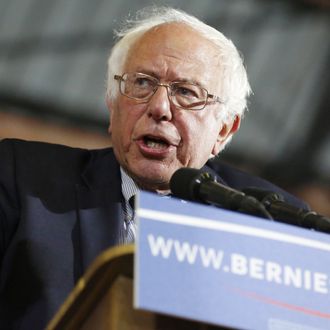
Bernie Sanders did not go gently into that California night. He did not concede the state or the primary. He did not congratulate Hillary Clinton and her supporters for clinching a majority of pledged delegates; nor did he compliment them for all the shiny shards of glass ceiling they were (metaphorically) covered in.
But those weren’t the only things he didn’t do. The Vermont senator didn’t criticize Clinton. He did not try to rationalize his apparent loss in California with reference to the Associated Press’s early call. And he did not use the words superdelegates or Establishment once.
In the days and weeks leading up to Tuesday night’s vote, a split had emerged within the Sanders campaign. His campaign manager — and longtime operative since the Burlington days — Jeff Weaver pledged in his (many) television interviews that the political revolution would be fought to the final roll-call vote in Philadelphia, even if Sanders lost California in a landslide. Senior strategist Tad Devine, meanwhile, suggested that after the final state primaries were done, the campaign should seek “common ground” with Clinton. The candidate himself appeared to take a position between his two advisers, but he took a step toward Weaver, suggesting he would reassess the campaign after Tuesday’s results were in. In public statements, Sanders emphasized that a win in California was critical for his “flip the superdelegates” strategy.
He was on his way to losing California when he stepped up to the microphone in Santa Monica Tuesday night. And he delivered the first speech of the end of his campaign. Sanders opened by framing the success and significance of his campaign, giving special emphasis to his genuinely astounding performance among younger voters, saying they made him “enormously optimistic” about the future of our politics. Then the senator turned to the present moment, and the first political challenge he chose to highlight was significant.
Our campaign from Day 1 has understood some very basic points, and that is first, we will not allow right-wing Republicans to control our government. And that is especially true with Donald Trump as the Republican candidate. The American people in my view will never support a candidate whose major theme is bigotry. Who insults Mexicans, who insults Muslims and women and African Americans. We will not allow Donald Trump to become president of the United States.
Priority No. 1: Defeat Donald Trump. Sanders then outlined priority No. 2.
But we understand that our mission is more than just defeating Trump, it is transforming our country. The vast majority of the American people know that it is not acceptable that the top tenth of 1 percent owns as much wealth as the bottom 90 percent; we’re going to change that. And when millions of Americans are working longer hours for lower wages, we will not allow 57 percent of all new income to go to the top 1 percent. And we will end a corrupt campaign finance system.
Still no mention of the need for Democrats to nominate a “true progressive” or the candidate with the best poll numbers against Trump. Sanders went on to emphasize the importance of the rest of his agenda, which was about something “more than Bernie.” And then Hillary Clinton got her shout-out.
And tonight, I had a very gracious call from Secretary Clinton and congratulated her on her victories tonight. Our fight is to transform our country and to understand that we are in this together. To understand that all of what we believe is what the majority of the American people believe.
The lines immediately following the mention of Clinton’s name are significant: The movement’s fight is to transform the country, by spreading the understanding that “what we believe” is what “the majority” believes. Which is to say, our platform can win a general election, and Clinton should take notice.
The senator did vow to remain a candidate through the Washington, D.C., primary next week (a contest he is almost certain to lose). But when he mentioned the Democratic convention, he described a fight over an agenda, not superdelegates, vowing to “take our fight for social, economic, racial, and environmental justice to Philadelphia, Pennsylvania!”
The Sanders campaign may be bitter, but it isn’t stupid. According to a behind-the-scenes report in Politico, top Sanders aides have known for “weeks, if not months” that they weren’t going to win. While the campaign has justified its continued existence on the premise that Trump presents such a grave electoral threat that Democrats must nominate the candidate with the strongest poll numbers against him, in private the rationale is the exact opposite: Many Sanders operatives have felt comfortable continuing the fight precisely because of the “Trump’s-got-no-real-shot safety net.”
Sanders knows he isn’t going to convince the party elites he’s spent most of the past year railing against to throw him the nomination. Based on last night’s speech and Politico’s dispatch, it appears the democratic socialist is just looking for platform concessions and some flattering gestures from the party’s power brokers to quiet his inner Rodney Dangerfield (per Politico, “Sanders is himself filled with resentment, on edge, feeling like he gets no respect.”). President Obama provided one such gesture late Tuesday night, honoring Sanders’s request for a meeting at the White House to discuss the “significant issues at stake in this election,” and, implicitly, the terms of his surrender.
If the Clinton camp can find a way to accommodate Sanders’s policy ambitions and frustrated ego, it should be able to secure America’s hippest septuagenarian as their millennial ambassador this fall.






























